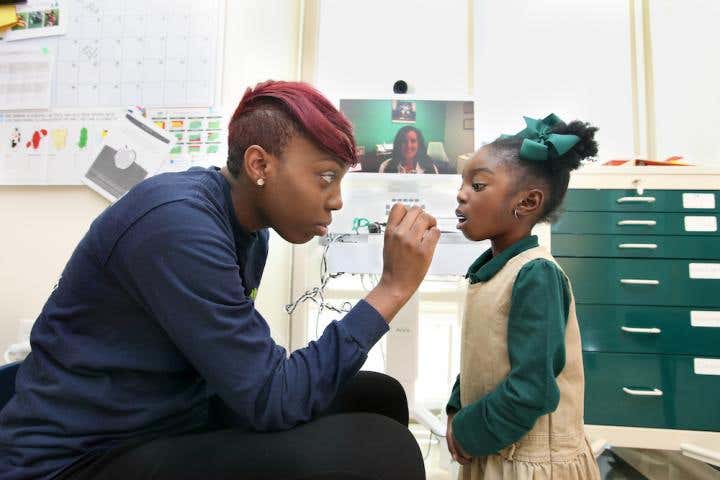School-based telehealth connects underserved kids to quality and sustainable health care
Implementation of school-based telehealth in communities facing health care barriers across South Carolina provides children with accessible

[Mar. 24, 2021: Medical University of South Carolina]
Many children of low-income families across the country do not have access to quality health care. Lack of health care can have a domino effect, affecting educational outcomes in the classroom.
School-based telehealth could offer a sustainable and effective solution, according to a new report in the Journal for Nurse Practitioners by Kathryn King Cristaldi, M.D., the medical director of the school-based telehealth program, and Kelli Garber, the lead advanced practice provider and clinical integration specialist for the program.
The program through the MUSC Health Center for Telehealth has effectively served over 70 schools across the state of South Carolina. Evaluating a child at school via telehealth is a time-efficient process that removes the geographic and transportation barriers many families face when accessing health care for their children.
"When a family wants their child to have a visit, the school nurse requests a visit from the telehealth provider group," said Garber. "Our goal is to ensure a connection between the school nurse and the provider group in 15 minutes, but our average time is three to six minutes. Using the telehealth equipment in the nurse's office, we evaluate the child, and then most of the time, we return the child to class and send any prescriptions to the local pharmacy."
The school-based telehealth program is particularly effective for children with asthma.
"I think that's where telehealth really shines," said Cristaldi. "A typical in-office provider visit for a patient with asthma would involve ordering a controller inhaler and seeing the patient in three months. Through telehealth, there are more touch points with a patient. If a child has exacerbated asthma, we could start steroids today and see them tomorrow to ensure treatment is working."
Additionally, school nurses are on hand to administer daily medication to children.
"We really thought a lot about one thing we could change to reduce the number of emergency room visits for children with asthma, and that one thing was using their controller medication every single day," said Cristaldi. "Getting the school nurse involved with daily medication has been a game changer."
Thanks to the program, underserved communities across South Carolina, including those in some of the poorest and most rural parts of the state, now have access to care.
"Children in Williamsburg County, Sumter County and Cherokee County now have access to care," said Cristaldi. "We are making incremental changes in the health care structure for children in South Carolina and supporting providers across the state who are, one by one, making profound differences."
Like these kind of stories? Get The Brighter Side of News' newsletter.
When kids' health improves, they do better in school. This was shown when underserved children were provided with health care at school-based health centers across the US. Their academic performances improved, and they were less likely to be absent from school. Children with asthma also required fewer Emergency Department visits. Unfortunately, funding for these centers has been inconsistent. School-based telehealth offers a more sustainable alternative to these programs while providing many of the same benefits.
The report by Cristaldi, Garber and colleagues provides a roadmap for other institutions considering a school-based telehealth program. It gives a detailed overview of the school-based telehealth workflow and tips for circumventing challenges, ranging from school nurse and provider availability to missed class time for students, which are unique to delivering health care in an educational environment. However, each region has its own needs and challenges, and Cristaldi and Garber encourage people to reach out to their regional telehealth centers for more information about school-based telehealth implementation in their local areas. More information on regional telehealth centers can be found at https://telehealthresourcecenter.org/.
About the Medical University of South Carolina
Founded in 1824 in Charleston, the Medical University of South Carolina (MUSC) is the oldest medical school in the South as well as the state's only integrated academic health sciences center with a unique charge to serve the state through education, research and patient care. Each year, MUSC educates and trains more than 3,000 students and nearly 800 residents in six colleges: Dental Medicine, Graduate Studies, Health Professions, Medicine, Nursing and Pharmacy. The state's leader in obtaining biomedical research funds, in fiscal year 2019, MUSC set a new high, bringing in more than $284 million. For information on academic programs, visit musc.edu.
As the clinical health system of the Medical University of South Carolina, MUSC Health is dedicated to delivering the highest quality patient care available while training generations of competent, compassionate health care providers to serve the people of South Carolina and beyond. Comprising some 1,600 beds, more than 100 outreach sites, the MUSC College of Medicine, the physicians' practice plan and nearly 325 telehealth locations, MUSC Health owns and operates eight hospitals situated in Charleston, Chester, Florence, Lancaster and Marion counties. In 2020, for the sixth consecutive year, U.S. News & World Report named MUSC Health the No. 1 hospital in South Carolina. To learn more about clinical patient services, visit muschealth.org.
MUSC and its affiliates have collective annual budgets of $3.2 billion. The more than 17,000 MUSC team members include world-class faculty, physicians, specialty providers and scientists who deliver groundbreaking education, research, technology and patient care.
Tags: #New_Discoveries, #New_Innovation, #Medical_Good_News, #Telehealth, #Schools, #The_Brighter_Side_of_News



